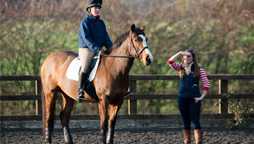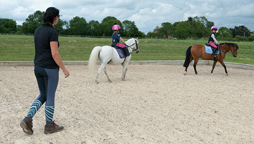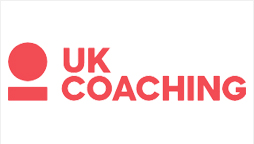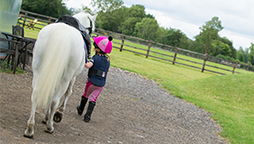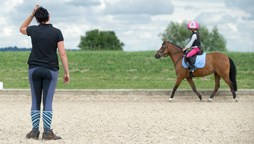Introduction to coaching
Coaching is a vital part of the equestrian industry, and British Equestrian and our Member Bodies have initiatives that are designed to help coaches to progress and develop. The majority of British Equestrian's work in coaching is delivered through the Coach Development Action Team (CDAT), the national source group for equestrian coaching with designated coaching leads from our Member Bodies. We also work closely with UK Coaching to offer support to our coaches.
The term 'coaching' refers to teaching, instructing, training and all methods of helping a rider or horse/rider partnership to improve. We believe that the promotion of quality coaching is the privilege and responsibility of all organisations involved in our sport and industry.
The coaching pathway
We and our member bodies encourage anyone who coaches or wants to become a coach in equestrian sport to become qualified. The process and the learning taken will ensure your practice is safer for those you’re coaching and will ensure the outcomes for both human and equine athlete are improved.
There are three pathways you can choose from to become a qualified equestrian coach...
- British Horse Society (BHS) Equine Excellence pathway
- Riding for the Disabled Association (RDA) Coaches pathway
- Equestrian Coaching Certificate pathway
BHS Pathway
The BHS Coach in Complete Horsemanship Pathway is globally recognised. Through this pathway you will learn all elements of equitation, horse care, stable management and coaching to become a complete coach in the equine industry. This pathway supports the fundamental skills required to coach both entry level and professional competitive equestrians and care and management and riding. You will learn practical, real-world skills within a structured platform to support you along your journey.
The Pathway begins with Stage 1 and progresses from there, with the ‘Teach’ element coming in at Stage 2. A milestone achievement is the Stage 3 in Complete Horsemanship because this qualification allows you to join the BHS Accredited Professional Coach (APC) scheme. As an APC you will have access to benefits such as branded clothing, an online business toolkit, first aid and safeguarding courses, access to an exclusive online professional community with free business support and resources, and the option to take out Public Liability insurance for the duration of your membership. Of course, you can continue to progress after Stage 3 right through to the BHS Fellowship. BHS Fellows are renowned throughout the global equine industry as ambassadors for the equestrian profession and are leading coaches in their field.
For more information on the BHS Coach in Complete Horsemanship, or the other career pathways that the BHS can support, click here.
RDA Pathway
Being a Riding for the Disabled Association (RDA) Coach is a uniquely rewarding challenge, offering the chance to unlock potential in everyone you work with. Whether you’re thinking about starting your coaching journey or taking your skills to the next level, the RDA Pathway will help you learn, practice and build confidence in yourself – it might even inspire you to go further.
There are three levels of coaching qualification available, with a seamless pathway from Green Card training onto the coaching pathway...
- Coach in Training
- Coach Certificate
- Advanced Coach Certificate
There’s a range of practical and theory modules that need to be completed as you work towards each qualification in order to give you the training needed for assessment. The modules are all in bite-sized chunks, meaning they can be delivered as a whole module or in separate sections, so there’s the option of flexible learning if needed.
The RDA has links to the Equestrian Coaching Certificate and BHS qualifications, for anyone wishing to come forward with qualifications already recognised.
For more information on how to become a coach with the RDA, click here.
Equestrian Coaching Certificate
This pathway of qualifications is currently endorsed by the UK Coaching Certificate (UKCC) and is the route for most of our sport-specific Member Bodies. It’s part of a framework that has been adopted for coaching qualifications by a large number of sports outside of equestrian.
Principles of the Equestrian Coaching Certificate
- Puts riders/drivers at the heart of what we do
- Provides a flexible qualification for all, in all coaching environments
- Provides technical coaching pathways for riding and driving, and equestrian sport-specific pathways including endurance, polocrosse, dressage, showjumping and eventing at different levels
- Aspiring coaches can be assured of a standardised qualification
What’s expected at each Coaching Certificate Level?
- The role of the Level 1 coach is to: 'Assist more qualified coaches by delivering aspects of coaching sessions, normally under direct supervision'
- The role of the Level 2 coach is to: 'Prepare for, deliver and review coaching sessions'
- The role of the Level 3 coach is to: 'Plan, implement, analyse and revise annual coaching programmes'
- A Level 4 coach is a beacon high-performing coach for their participant group, i.e...
- Riders up to the age of 12 of all abilities
- Teenagers of all abilities
- Adult participation riders over the age of 18 of all abilities
- Adult competitive riders who are over the age of 18, with a focus on being competitive against others. These riders will train with the aim of competing successfully and moving up the levels.
- Performance development riders who are identified for the talent pathway programme and squads working towards senior high-performance
- High-performance riders who are selected to represent their country
NB. When we use the terms ‘riders’ or ‘riding’, it includes carriage-driving and vaulting activity.
All four levels of the Equestrian Coaching Certificate comprise of a number of days of taught content, followed by formal assessment. To find out more about each of the individual levels that make up the Equestrian Coaching Certificate, click here.
Our Coaching Strategy
CDAT members have collaborated on developing a federation-wide coaching strategy, entitled ‘Equestrian Coaching: Culture, Clarity, Profile and Value’. Collectively, CDAT members will be working to deliver the actions contained within the strategy, which will run from 2020–2025.
The Coaching survey
In the spring of 2019, in collaboration with CDAT, British Equestrian conducted a survey of our coaching workforce. This survey informed and underpinned the development of the strategy, and we we'll continue to conduct a coaching survey on an annual basis.
The report from the 2019 survey includes...
- Who are coaches?
- What qualifications do coaches hold?
- Where are coaches working?
- Who are coaches coaching?
- What are coaches coaching?
- What coaches are hoping for in the future, be it qualifications they'd like to take or continuing professional development (CPD) opportunities
